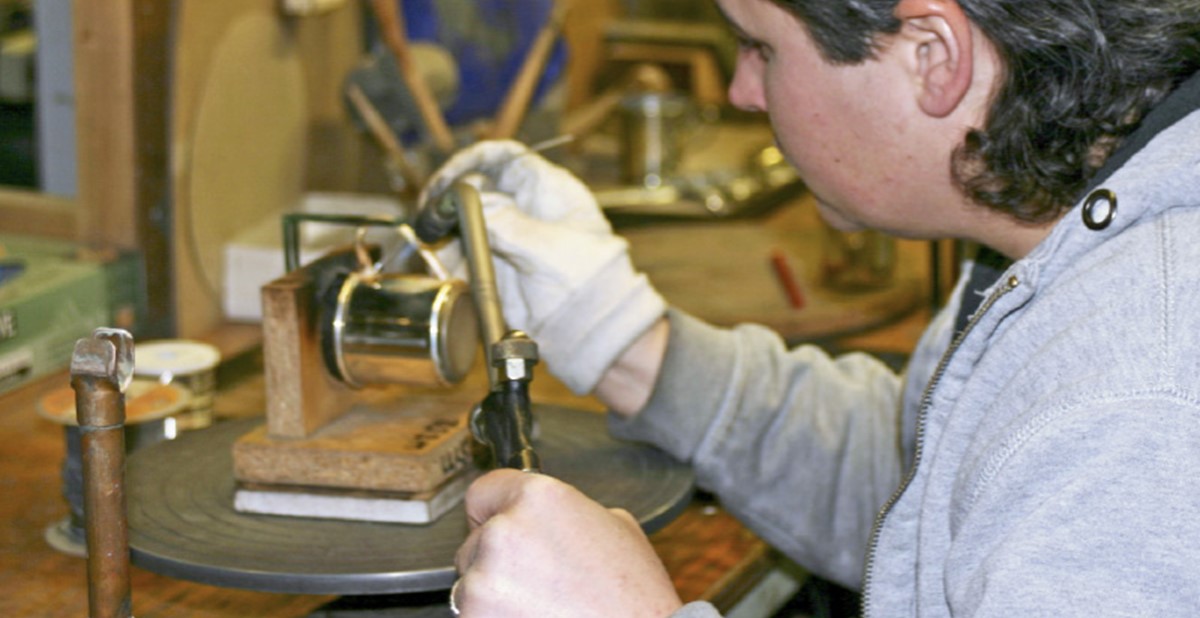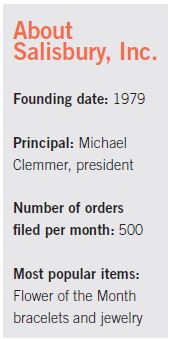Factory Floor: A Modern Take On An Old-World Craft

In the promotional products industry, countless people play a role in a product’s creation, customization and distribution. The finished products transfer hands many times, from supplier to distributor, to client to end user, with dozens of people involved at every step until the product is placed in the recipients’ hands. But at Salisbury, Inc., an Easton, Maryland-based supplier, the hands that pass the company’s pewter, sterling silver and aluminum gifts, awards and keepsakes are the ones who breathe life into the metals.
Behind Salisbury’s fine, high-quality products is a staff of 30 dedicated artisans, including four outside artists and metal spinners, who are responsible for handmaking all the company’s heirloom-quality products. “Our artisans are the heart of the company,” says Joe Bernstein, sales manager. Salisbury’s artists, who specialize in metal spinning, machining, centrifugal casting, soldering and finishing, can create nearly anything, from an engraved pewter keepsake dish to present to a board member who has completed their term, to a cast aluminum serving board to commemorate an employee milestone, or, for the more personal moments, a sterling silver teething ring rattle to celebrate the birth of a baby.
Salisbury’s artisans take no shortcuts in the manufacturing process. “Every piece in the line is made by hand and may be handled more than 16 times,” says Bernstein. “There are machines involved, like a lathe, for instance, but all must be manipulated by highly skilled artisans.” It can take about two weeks to complete an order of 100 or more items from start to finish so Salisbury prepares by keeping a large inventory of products ready to pull at a moment’s notice. And the company’s full-time engravers—including a hand-engraver who uses old-world techniques to carve out the metal—can fulfill requests within just a few days.
 All the metalwork happens in Salisbury’s 50,000-square-foot facility in Easton, the company’s home since 1998. Founded in 1979, Salisbury was born after the merger of Kirk Pewter of Salisbury, Maryland, and Steiff Silver of Baltimore. When the merger happened, many of the artisans who worked for Kirk Pewter were uninterested in relocating from their coastal city to a major city more than two hours away, so they partnered with local businesses that invested in their work—and Salisbury was born. In its early days, Salisbury operated out of a small converted farmhouse, but after acquiring Webb Pewter and Sterling of Philadelphia in 1998, it relocated to its current facility.
All the metalwork happens in Salisbury’s 50,000-square-foot facility in Easton, the company’s home since 1998. Founded in 1979, Salisbury was born after the merger of Kirk Pewter of Salisbury, Maryland, and Steiff Silver of Baltimore. When the merger happened, many of the artisans who worked for Kirk Pewter were uninterested in relocating from their coastal city to a major city more than two hours away, so they partnered with local businesses that invested in their work—and Salisbury was born. In its early days, Salisbury operated out of a small converted farmhouse, but after acquiring Webb Pewter and Sterling of Philadelphia in 1998, it relocated to its current facility.
Not only are Salisbury’s products all handcrafted in its facility, but so is most of the pewter and sterling silver the company uses—in fact, none of its metal products are mass-produced—along with its cast aluminum line and its molds and models. And even though fine metal products are timeless in nature, Salisbury has also managed to adapt with the times. Over the past year, the company has directed its focus to creating products that mesh traditional and modern elements to appeal to its growing base of younger customers.
PPB spoke with Bernstein to learn more about the complex process behind Salisbury’s products.
PPB Salisbury’s staff is comprised of many skilled artisans. Can you tell us about their different specialties?
Bernstein Our talented artisans perform the highly skilled techniques of metal spinning, machining, centrifugal casting, soldering and finishing to create the line. Metal spinners use an old-world method to turn flat metal into 3D items. They place a disc of pewter on a lathe, and, using tools of their creation, pull the spinning disc of metal slowly over a mold called a “chuck” to form the desired shape. Cups, bowls, trays, jewelry boxes and more are created using this method. Metal spinners can take 10 years or more to train from an apprentice status to become a master spinner.
When the metal-spinning is finished, solderers permanently piece together the spun components using a lead-free solder. They attach bases to cups, handles to trophies and tankards, spouts to teapots, and add countless other details to the line. If the product is created from flat, pressed sheets of metal, like picture frames, baby spoons and small trays, the items are then sent to skilled machinists who use Salisbury’s hydraulic presses and drop hammers with metal forms to force the flat sheet into a new shape, creating beautiful heirloom-quality gifts.
After the products have been spun, hammered, pressed and soldered, they go on to one last process: finishing. Finishing is truly what sets our pewter and sterling products apart from all others. These fine artisans take the nearly-completed products and buff them over and over. This removes any scratches or manufacturing marks, leaving items with a brilliant, mirror-like finish.
In addition to spinning, soldering and finishing for large items, we create smaller products and components through the process of centrifugal casting. The process is part science, part art. Molten pewter is poured into spinning, vulcanized rubber molds that are created in-house by our mold and modeling artists. The hot metal flows into the design area and the air is forced out of the existing channels that are cut into each mold. After the molten metal cools and becomes solid, the pieces are removed, sharp edges are ground down and items are sent to the tumbling room. There, they are placed in large machines and tumbled with millions of ceramic beads until the surface of the metal is smooth.
Finished products then go through a strict inspection for quality control. Inspectors have a keen eye for every detail. Products that pass our rigorous inspection are either packaged for shipping around the world or sent to the engraving department where we add any type of personalization imaginable.
PPB What are some of the ways that Salisbury’s products have been used for promotions, recognition or corporate gifting?
Bernstein Salisbury products are used in a promotional capacity every day. One of our favorite corporate gifting uses was a program created for the labor and delivery unit in a very busy hospital. With a great many babies being born there every month, they decided a new mother gift package would be a great way to congratulate new mothers while promoting the hospital and spreading good will. They chose a beautiful Salisbury pewter baby cup, added the hospital logo engraved on the side—leaving the other side blank for a future monogram—and paired it with a diaper bag set. This included a letter from the CEO, personally congratulating each new mother. It was a beautiful gesture and well-received by new mothers throughout the years the program was in place.
Another of our favorite corporate gifting stories was of a New England insurance company that has always recognized its employees’ years of service levels with different-sized Salisbury pewter trays. One day, the distributor called with a request to recognize a very special employee who had been with the company for 60 years. Our 12-inch sterling silver tray was perfect for the job, and made a presentation that was nothing short of spectacular. Salisbury’s products have also been used by government agencies as gifts to foreign dignitaries, and they’ve been used in the White House since Ronald Reagan held office.



 First, the metal spinner performs a process that creates 3D items out of flat-pressed metal.
First, the metal spinner performs a process that creates 3D items out of flat-pressed metal.
 The item is then transferred to a solderer, who pieces together parts of the item, like bases and handles, using a solder.
The item is then transferred to a solderer, who pieces together parts of the item, like bases and handles, using a solder.
 Next, the item undergoes a finishing process, where it is repeatedly buffed to rid of any imperfections and leave a smooth, mirror-like finish.
Next, the item undergoes a finishing process, where it is repeatedly buffed to rid of any imperfections and leave a smooth, mirror-like finish.
 If the item is being engraved, it is sent to a team of machine engravers—along with a hand engraver—who can add simple text, monograms, logos, custom images, full award setups and more.
If the item is being engraved, it is sent to a team of machine engravers—along with a hand engraver—who can add simple text, monograms, logos, custom images, full award setups and more.
–––––––––––––––––––––––––––––––––––––––––––––––––––––––––––
Danielle Renda is associate editor of PPB.

